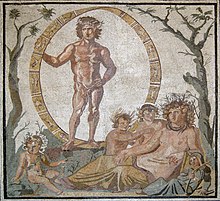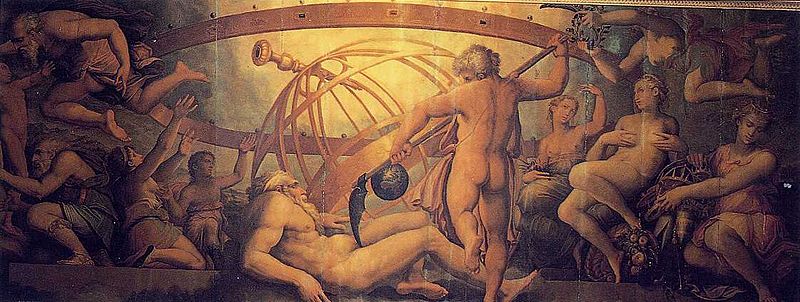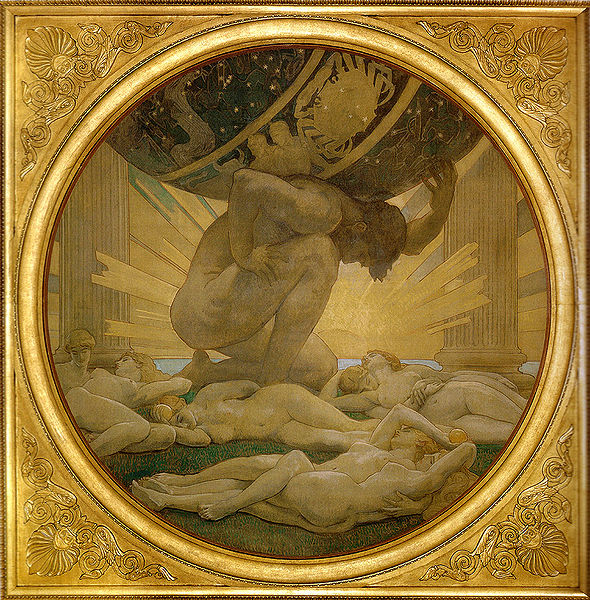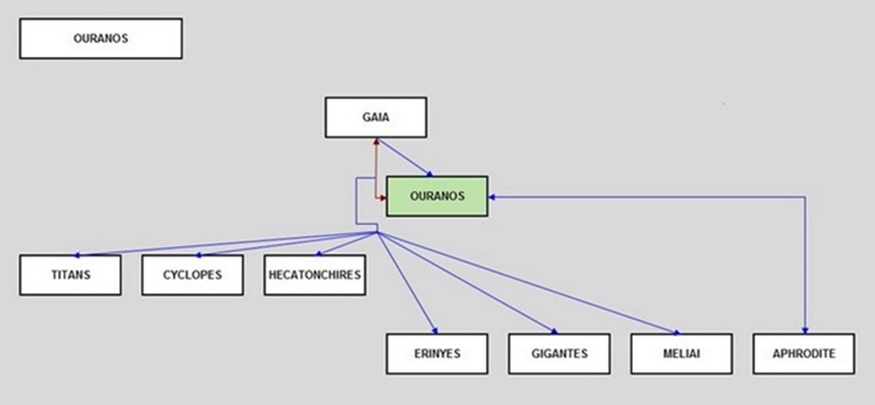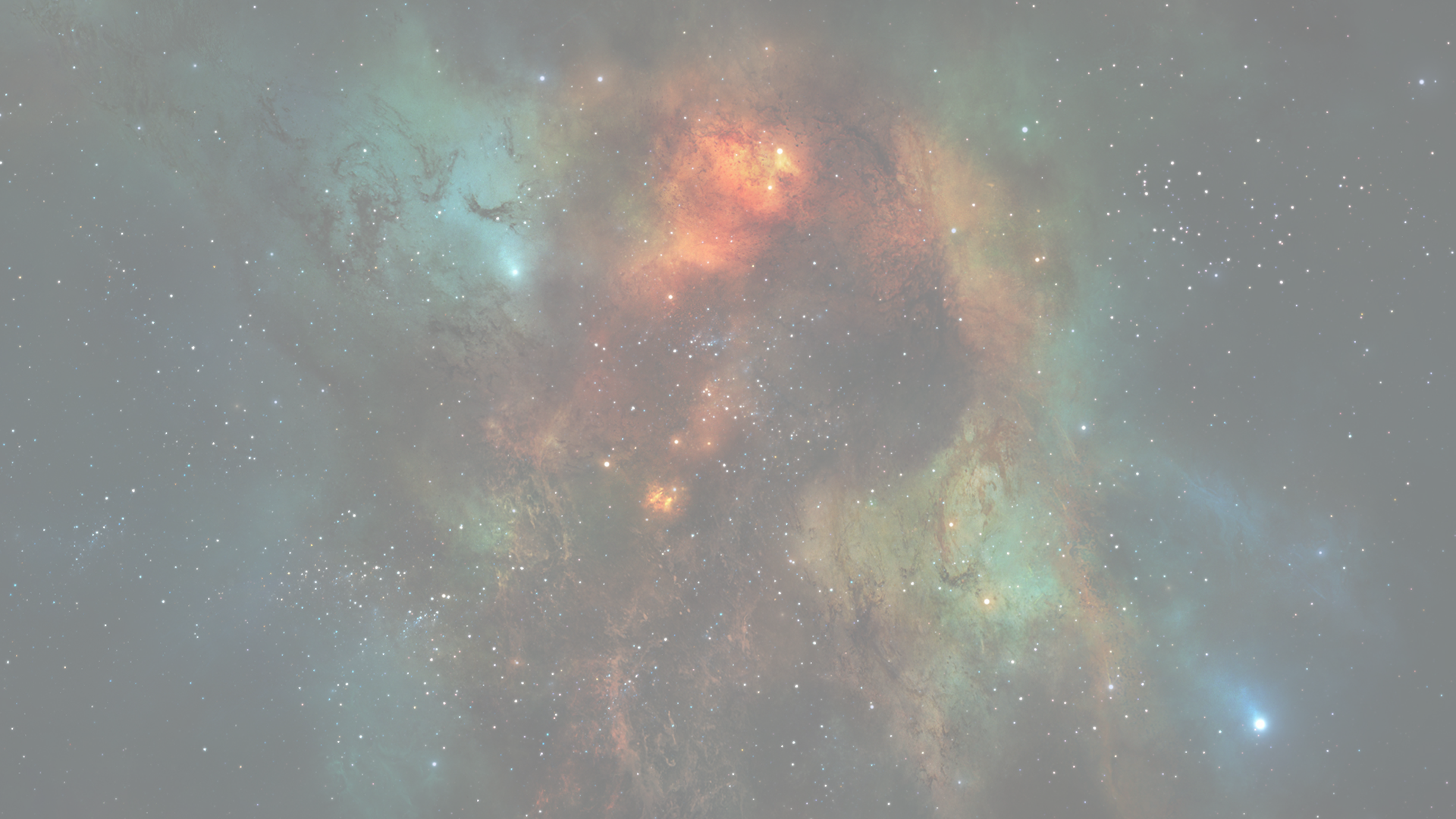
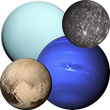
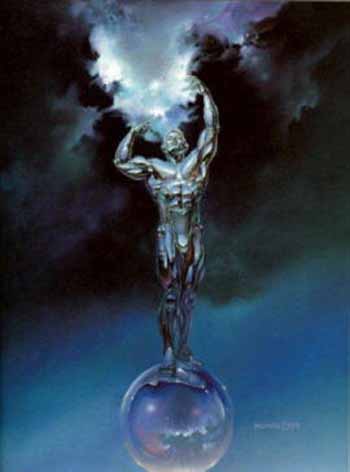
Rough Notes:
Uranus the primal Greek god personifying the sky. His equivalent in Roman mythology was Caelus. In Ancient Greek literature, Uranus or Father Sky was the son and husband of Gaia, Mother Earth. According to Hesiod's Theogony, Uranus was conceived by Gaia alone, but other sources cite Aether as his father. Uranus and Gaia were the parents of the first generation of Titans, and the ancestors of most of the Greek gods, but no cult addressed directly to Uranus survived into Classical times, and Uranus does not appear among the usual themes of Greek painted pottery. Elemental Earth, Sky and Styx might be joined, however, in a solemn invocation in Homeric epic.
Most Greeks considered Uranus to be primordial, and gave him no parentage, believing him to have been born from Chaos, the primal form of the universe. However, in Theogony, Hesiod claims Uranus to be the offspring of Gaia, the earth goddess. Alcman and Callimachus elaborate that Uranus was fathered by Aether, the god of heavenly light and the upper air. Under the influence of the philosophers, Cicero, in De Natura Deorum ("Concerning the Nature of the Gods"), claims that he was the offspring of the ancient gods Aether and Hemera, Air and Day. According to the Orphic Hymns, Uranus was the son of Nyx, the personification of night.
n the Olympian creation myth, as Hesiod tells it in the Theogony, Uranus came every night to cover the earth and mate with Gaia, but he hated the children she bore him. Hesiod named their first six sons and six daughters the Titans, the three one-hundred-armed giants the Hekatonkheires, and the one-eyed giants the Cyclopes.
Uranus imprisoned Gaia's youngest children in Tartarus, deep within Earth, where they caused pain to Gaia. She shaped a great flint-bladed sickle and asked her sons to castrate Uranus. Only Cronus, youngest and most ambitious of the Titans, was willing: he ambushed his father and castrated him, casting the severed testicles into the sea.
For this fearful deed, Uranus called his sons Titanes Theoi, or "Straining Gods." From the blood that spilled from Uranus onto the Earth came forth the Gigantes, the Erinyes (the avenging Furies), the Meliae (the ash-tree nymphs), and, according to some, the Telchines.
From the genitals in the sea came forth Aphrodite. The learned Alexandrian poet Callimachus reported that the bloodied sickle had been buried in the earth at Zancle in Sicily, but the Romanized Greek traveller Pausanias was informed that the sickle had been thrown into the sea from the cape near Bolina, not far from Argyra on the coast of Achaea, whereas the historian Timaeus located the sickle at Corcyra; Corcyrans claimed to be descendants of the wholly legendary Phaeacia visited by Odysseus, and by circa 500 BCE one Greek mythographer, Acusilaus, was claiming that the Phaeacians had sprung from the very blood of Uranus' castration.
After Uranus was deposed, Cronus re-imprisoned the Hekatonkheires and Cyclopes in Tartarus. Uranus and Gaia then prophesied that Cronus in turn was destined to be overthrown by his own son, and so the Titan attempted to avoid this fate by devouring his young. Zeus, through deception by his mother Rhea, avoided this fate.
These ancient myths of distant origins were not expressed in cults among the Hellenes. The function of Uranus was as the vanquished god of an elder time, before real time began.
After his castration, the Sky came no more to cover the Earth at night, but held to its place, and "the original begetting came to an end" (KerŽnyi). Uranus was scarcely regarded as anthropomorphic, aside from the genitalia in the castration myth. He was simply the sky, which was conceived by the ancients as an overarching dome or roof of bronze, held in place (or turned on an axis) by the Titan Atlas.
In formulaic expressions in the Homeric poems ouranos is sometimes an alternative to Olympus as the collective home of the gods; an obvious occurrence would be the moment in Iliad 1.495, when Thetis rises from the sea to plead with Zeus: "and early in the morning she rose up to greet Ouranos-and-Olympus and she found the son of Kronos ..."
William Sale remarks that "... 'Olympus' is almost always used of the home of the Olympian gods, but Ouranos often refers to the natural sky above us without any suggestion that the gods, collectively live there". Sale concluded that the earlier seat of the gods was the actual Mount Olympus, from which the epic tradition by the time of Homer had transported them to the sky, Ouranos. By the sixth century, when a "heavenly Aphrodite" (Urania) was to be distinguished from the "common Aphrodite of the people", Ouranos signifies purely the celestial sphere itself.
Uranus (mythology)
| Uranus | |
|---|---|
| Primordial god of the sky | |
| Abode | Sky |
| Personal Information | |
| Consort | Gaia |
| Children | The Titans, the Cyclopes, the Meliae, the Erinyes (Furies), the Giants, the Hekatonkheires and Aphrodite[1] |
| Parents | Gaia (Hesiod) or Aether and Gaia or Aether and Hemera or Nyx |
| Roman equivalent | Caelus |
Uranus (/ˈjʊərənəs/ or /jʊˈreɪnəs/; Ancient Greek Οὐρανός, Ouranos [oːranós] meaning "sky" or "heaven") was the primal Greek god personifying the sky. His name in Roman mythology was Caelus.[2] In Ancient Greek literature, Uranus or Father Sky was the son and husband of Gaia, Mother Earth. According to Hesiod's Theogony, Uranus was conceived by Gaia alone, but other sources cite Aether as his father.[3] Uranus and Gaia were the parents of the first generation of Titans, and the ancestors of most of the Greek gods, but no cult addressed directly to Uranus survived into Classical times,[4] and Uranus does not appear among the usual themes of Greek painted pottery. Elemental Earth, Sky and Styx might be joined, however, in a solemn invocation in Homeric epic.[5]
Contents
[hide]
Etymology[edit]
The most probable etymology traces the name to a Proto-Greek form *worsanós (Ϝορσανός)[6] enlarged from *ṷorsó- (also found in Greek ouréō ‘to urinate’, Sanskrit varṣá‘rain’, Hittite ṷarša- ‘fog, mist’).[7] The basic Indo-European root is *ṷérs- ‘to rain, moisten’ (also found in Greek eérsē ‘dew’, Sanskrit várṣati ‘to rain’, Avestan aiβi.varəšta ‘it rained on’), making Ouranos the ‘rainmaker’.[7] A less likely etymology is a derivative with meaning ‘the one standing on high’ from PIE *ṷérso- (cf. Sanskrit várṣman ‘height, top’, Lithuanian viršùs ‘upper, highest seat’, Russian verx ‘height, top’). Georges Dumézil’s equation[8] of Ouranos’ name with that of the Vedic deity Váruṇa (Mitanni Aruna), god of the sky and waters, is etymologically untenable.[9][10]
Genealogy[edit]
In Hesiod's Theogony, Uranus is the offspring of Gaia, the earth goddess.[11] Alcman and Callimachus elaborate that Uranus was fathered by Aether, the god of heavenly light and the upper air. Under the influence of the philosophers, Cicero, in De Natura Deorum ("Concerning the Nature of the Gods"), claims that he was the offspring of the ancient gods Aether and Hemera, Air and Day. According to the Orphic Hymns, Uranus was the son of Nyx, the personification of night.[citation needed] Uranus was the brother of Pontus, the God of the sea. [12]
Descendants of Gaia and Uranus[edit]
According to Hesiod's Theogony, Uranus mated with Gaia to create the twelve Titans: Oceanus, Coeus, Crius, Hyperion, Iapetus, Theia, Rhea, Themis, Mnemosyne, Phoebe, Tethys and Cronus;[13] the Cyclopes: Brontes, Steropes and Arges;[14] and the Hecatoncheires ("Hundred-Handed Ones"): Cottus, Briareos, and Gyges.[15]
| [hide]Descendants of Gaia (Earth) and Uranus (Sky) [16] | ||||||||||||||||||||||||||||||||||||||||||||||||||||||||||||||||||||||||||||||||||||||||||||||||||||||||||||||||||||||||||||||||||||||||||||||||||||||||||||||||||||||||||||||||||||||||||||||||||||||||||||||||||||||||||||||||||||||||||||||||||||||||||||||||||||||||||||||||||||||||||||||||||||||||||||||||||||||||||||||||||||||||||||||||||||||||||||||||||||||||||||||||||||||||||||||||||||||||||||||||||||||||||||||||||||||||||||||||||||||||||||||||||||||||||||||||||||||||||||||||||||||||||||||||||||||||||||||||||||||||||||||||||||||||||||||||||||||||||||||||||||||||||||||||||||||||||||||||||||||||||||||||||||||||||||||||||||||||||||||||||||||||||||||||||||||||||||||||||||||||||||||||||||||||||||||||||||||||||||||||||||||||||||||||||||||||||||||||||||||||||||||||||||||||||||||||||||||||||||||||||||||||||||||||||||||||||||||||||||||||||||||||||||||||||||||
|---|---|---|---|---|---|---|---|---|---|---|---|---|---|---|---|---|---|---|---|---|---|---|---|---|---|---|---|---|---|---|---|---|---|---|---|---|---|---|---|---|---|---|---|---|---|---|---|---|---|---|---|---|---|---|---|---|---|---|---|---|---|---|---|---|---|---|---|---|---|---|---|---|---|---|---|---|---|---|---|---|---|---|---|---|---|---|---|---|---|---|---|---|---|---|---|---|---|---|---|---|---|---|---|---|---|---|---|---|---|---|---|---|---|---|---|---|---|---|---|---|---|---|---|---|---|---|---|---|---|---|---|---|---|---|---|---|---|---|---|---|---|---|---|---|---|---|---|---|---|---|---|---|---|---|---|---|---|---|---|---|---|---|---|---|---|---|---|---|---|---|---|---|---|---|---|---|---|---|---|---|---|---|---|---|---|---|---|---|---|---|---|---|---|---|---|---|---|---|---|---|---|---|---|---|---|---|---|---|---|---|---|---|---|---|---|---|---|---|---|---|---|---|---|---|---|---|---|---|---|---|---|---|---|---|---|---|---|---|---|---|---|---|---|---|---|---|---|---|---|---|---|---|---|---|---|---|---|---|---|---|---|---|---|---|---|---|---|---|---|---|---|---|---|---|---|---|---|---|---|---|---|---|---|---|---|---|---|---|---|---|---|---|---|---|---|---|---|---|---|---|---|---|---|---|---|---|---|---|---|---|---|---|---|---|---|---|---|---|---|---|---|---|---|---|---|---|---|---|---|---|---|---|---|---|---|---|---|---|---|---|---|---|---|---|---|---|---|---|---|---|---|---|---|---|---|---|---|---|---|---|---|---|---|---|---|---|---|---|---|---|---|---|---|---|---|---|---|---|---|---|---|---|---|---|---|---|---|---|---|---|---|---|---|---|---|---|---|---|---|---|---|---|---|---|---|---|---|---|---|---|---|---|---|---|---|---|---|---|---|---|---|---|---|---|---|---|---|---|---|---|---|---|---|---|---|---|---|---|---|---|---|---|---|---|---|---|---|---|---|---|---|---|---|---|---|---|---|---|---|---|---|---|---|---|---|---|---|---|---|---|---|---|---|---|---|---|---|---|---|---|---|---|---|---|---|---|---|---|---|---|---|---|---|---|---|---|---|---|---|---|---|---|---|---|---|---|---|---|---|---|---|---|---|---|---|---|---|---|---|---|---|---|---|---|---|---|---|---|---|---|---|---|---|---|---|---|---|---|---|---|---|---|---|---|---|---|---|---|---|---|---|---|---|---|---|---|---|---|---|---|---|---|---|---|---|---|---|---|---|---|---|---|---|---|---|---|---|---|---|---|---|---|---|---|---|---|---|---|---|---|---|---|---|---|---|---|---|---|---|---|---|---|---|---|---|---|---|---|---|---|---|---|---|---|---|---|---|---|---|---|---|---|---|---|---|---|---|---|---|---|---|---|---|---|---|---|---|---|---|---|---|---|---|---|---|---|---|---|---|---|---|---|---|---|---|---|---|---|---|---|---|---|---|---|---|---|---|---|---|---|---|---|---|---|---|---|---|---|---|---|---|---|---|---|---|---|---|---|---|---|---|---|---|---|---|---|---|---|---|---|---|---|---|---|---|---|---|---|---|---|---|---|---|---|---|---|---|---|---|---|---|---|---|---|---|---|---|---|---|---|---|---|---|---|---|---|---|---|---|---|---|---|---|---|---|---|---|---|---|---|---|---|---|---|---|---|---|---|---|---|---|---|---|---|---|---|---|---|---|---|---|---|---|---|---|---|---|---|---|---|---|---|---|---|---|---|---|---|---|---|---|---|---|---|---|---|---|---|---|---|---|---|---|---|---|---|---|---|---|---|---|---|---|---|---|---|---|---|---|---|---|---|---|---|---|---|---|---|---|---|---|---|---|---|---|---|---|---|---|---|---|---|---|---|---|---|---|---|---|---|---|---|---|---|---|---|---|---|---|---|---|---|
|
||||||||||||||||||||||||||||||||||||||||||||||||||||||||||||||||||||||||||||||||||||||||||||||||||||||||||||||||||||||||||||||||||||||||||||||||||||||||||||||||||||||||||||||||||||||||||||||||||||||||||||||||||||||||||||||||||||||||||||||||||||||||||||||||||||||||||||||||||||||||||||||||||||||||||||||||||||||||||||||||||||||||||||||||||||||||||||||||||||||||||||||||||||||||||||||||||||||||||||||||||||||||||||||||||||||||||||||||||||||||||||||||||||||||||||||||||||||||||||||||||||||||||||||||||||||||||||||||||||||||||||||||||||||||||||||||||||||||||||||||||||||||||||||||||||||||||||||||||||||||||||||||||||||||||||||||||||||||||||||||||||||||||||||||||||||||||||||||||||||||||||||||||||||||||||||||||||||||||||||||||||||||||||||||||||||||||||||||||||||||||||||||||||||||||||||||||||||||||||||||||||||||||||||||||||||||||||||||||||||||||||||||||||||||||||||
Further, according to the Theogony, when Cronus castrated Uranus, from Uranus' blood, which splattered onto the earth, came the Erinyes (Furies), the Giants, and the Meliae. Also, according to the Theogony, Cronus threw the severed genitals into the sea, around which foam developed and transformed into the goddess Aphrodite,[17] although according to Homer, Aphrodite was the daughter of Zeus and Dione.[18]
| [hide]Descendants of Gaia and Uranus' blood, and Uranus' genitals, according Hesiod [19] | |||||||||||||||||||||||||||||||||||||||||||||||||||||||||||||||||||||||||||||||||||||||||||||||||||||||||||||||||||||||||||||||||||||||||||
|---|---|---|---|---|---|---|---|---|---|---|---|---|---|---|---|---|---|---|---|---|---|---|---|---|---|---|---|---|---|---|---|---|---|---|---|---|---|---|---|---|---|---|---|---|---|---|---|---|---|---|---|---|---|---|---|---|---|---|---|---|---|---|---|---|---|---|---|---|---|---|---|---|---|---|---|---|---|---|---|---|---|---|---|---|---|---|---|---|---|---|---|---|---|---|---|---|---|---|---|---|---|---|---|---|---|---|---|---|---|---|---|---|---|---|---|---|---|---|---|---|---|---|---|---|---|---|---|---|---|---|---|---|---|---|---|---|---|---|---|
|
|||||||||||||||||||||||||||||||||||||||||||||||||||||||||||||||||||||||||||||||||||||||||||||||||||||||||||||||||||||||||||||||||||||||||||
Creation myth[edit]
Greek mythology[edit]
|
This section needs additional citations for verification. Please help improve this article by adding citations to reliable sources. Unsourced material may be challenged and removed. (November 2016) (Learn how and when to remove this template message)
|
The Mutilation of Uranus by Saturn: fresco by Giorgio Vasari and Cristofano Gherardi, c. 1560 (Sala di Cosimo I, Palazzo Vecchio)
In the Olympian creation myth, as Hesiod tells it in the Theogony,[20] Uranus came every night to cover the earth and mate with Gaia, but he hated the children she bore him. Hesiod named their first six sons and six daughters the Titans, the three one-hundred-handed giants the Hekatonkheires, and the one-eyed giants the Cyclopes.
Uranus imprisoned Gaia's youngest children in Tartarus, deep within Earth, where they caused pain to Gaia. She shaped a great flint-bladed sickle and asked her sons to castrate Uranus. Only Cronus, youngest and most ambitious of the Titans, was willing: he ambushed his father and castrated him, casting the severed testicles into the sea.
For this fearful deed, Uranus called his sons Titanes Theoi, or "Straining Gods."[21] From the blood that spilled from Uranus onto the Earth came forth the Giants, the Erinyes (the avenging Furies), the Meliae (the ash-tree nymphs), and, according to some, the Telchines. From the genitals in the sea came forth Aphrodite.
The learned Alexandrian poet Callimachus[22] reported that the bloodied sickle had been buried in the earth at Zancle in Sicily, but the Romanized Greek traveller Pausanias was informed that the sickle had been thrown into the sea from the cape near Bolina, not far from Argyra on the coast of Achaea, whereas the historian Timaeus located the sickle at Corcyra;[23] Corcyrans claimed to be descendants of the wholly legendary Phaeacia visited by Odysseus, and by circa 500 BCE one Greek mythographer, Acusilaus, was claiming that the Phaeacians had sprung from the very blood of Uranus' castration.[24]
After Uranus was deposed, Cronus re-imprisoned the Hekatonkheires and Cyclopes in Tartarus. Uranus and Gaia then prophesied that Cronus in turn was destined to be overthrown by his own son, and so the Titan attempted to avoid this fate by devouring his young. Zeus, through deception by his mother Rhea, avoided this fate.
These ancient myths of distant origins were not expressed in cults among the Hellenes.[25] The function of Uranus was as the vanquished god of an elder time, before real time began.
After his castration, the Sky came no more to cover the Earth at night, but held to its place, and "the original begetting came to an end" (Kerényi). Uranus was scarcely regarded as anthropomorphic, aside from the genitalia in the castration myth. He was simply the sky, which was conceived by the ancients as an overarching dome or roof of bronze, held in place (or turned on an axis) by the Titan Atlas. In formulaic expressions in the Homeric poems ouranos is sometimes an alternative to Olympus as the collective home of the gods; an obvious occurrence would be the moment in Iliad 1.495, when Thetis rises from the sea to plead with Zeus: "and early in the morning she rose up to greet Ouranos-and-Olympus and she found the son of Kronos ..."
William Sale remarks that "... 'Olympus' is almost always used of [the home of the Olympian gods], but ouranos often refers to the natural sky above us without any suggestion that the gods, collectively live there".[26]Sale concluded that the earlier seat of the gods was the actual Mount Olympus, from which the epic tradition by the time of Homer had transported them to the sky, ouranos. By the sixth century, when a "heavenly Aphrodite" (Aphrodite Urania) was to be distinguished from the "common Aphrodite of the people", ouranos signifies purely the celestial sphere itself.
Hurrian mythology[edit]
The Greek creation myth is similar to the Hurrian creation myth. In Hurrian religion Anu is the sky god. His son Kumarbis bit off his genitals and spat out three deities, one of whom, Teshub, later deposed Kumarbis.[27] In Sumerian mythology and later for Assyrians and Babylonians, Anu is the sky god and represented law and order.[citation needed]
It is possible that Uranus was originally an Indo-European god, to be identified with the Vedic Váruṇa, the supreme keeper of order who later became the god of oceans and rivers, as suggested by Georges Dumézil,[8]following hints in Émile Durkheim, The Elementary Forms of Religious Life (1912).[28] Another of Dumézil's theories is that the Iranian supreme God Ahura Mazda is a development of the Indo-Iranian *vouruna-*mitra.[29]Therefore, this divinity has also the qualities of Mitra, which is the god of the falling rain.[30]
Uranus and Váruṇa[edit]
|
This section needs additional citations for verification. Please help improve this article by adding citations to reliable sources. Unsourced material may be challenged and removed. (November 2016) (Learn how and when to remove this template message)
|
Uranus is connected with the night sky, and Váruṇa is the god of the sky and the celestial ocean, which is connected with the Milky Way. His daughter Lakshmi is said to have arisen from an ocean of milk, a myth similar to the myth of Aphrodite.
Georges Dumézil made a cautious case for the identity of Uranus and Vedic Váruṇa at the earliest Indo-European cultural level.[8] Dumézil's identification of mythic elements shared by the two figures, relying to a great extent on linguistic interpretation, but not positing a common origin, was taken up by Robert Graves and others. The identification of the name Ouranos with the Hindu Váruṇa, based in part on a posited PIE root *-ŭerwith a sense of "binding"—ancient king god Váruṇa binds the wicked, ancient king god Uranus binds the Cyclopes, who had tormented him. The most probable etymology is from Proto-Greek *(F)orsanόj (worsanos) from a PIE root *ers "to moisten, to drip" (referring to the rain).
Cultural context of flint[edit]
| Greek deities series |
|---|
| Primordial deities |
| Chthonic deities |
|
This section does not cite any sources. Please help improve this section by adding citations to reliable sources. Unsourced material may be challenged and removed. (November 2016) (Learn how and when to remove this template message)
|
The detail of the sickle's being flint rather than bronze or even iron was retained by Greek mythographers (though neglected by Roman ones). Knapped flints as cutting edges were set in wooden or bone sickles in the late Neolithic, before the onset of the Bronze Age. Such sickles may have survived latest in ritual contexts where metal was taboo, but the detail, which was retained by classical Greeks, suggests the antiquity of the mytheme.
Planet Uranus[edit]
|
This section does not cite any sources. Please help improve this section by adding citations to reliable sources. Unsourced material may be challenged and removed. (November 2016) (Learn how and when to remove this template message)
|
The ancient Greeks and Romans knew of only five 'wandering stars' (Greek: πλανήται, planētai): Mercury, Venus, Mars, Jupiter, and Saturn. Following the discovery of a sixth planet in the 18th century, there was some early disagreement regarding what to name it. Its discoverer, William Herschel, named it "The Georgian Star", the name preferred by English astronomers. Others preferred to name it "Herschel". Finally, the name Uranus was suggested by astronomer Johann Bode as the logical addition to the series, since Mars (Ares in Greek), Venus, and Mercury were the children of Jupiter, Jupiter (Zeus in Greek) the son of Saturn, and Saturn (Cronus in Greek) the son of Uranus. What is anomalous is that, while the others take Roman names, Uranus is a name derived from Greek in contrast to the Roman Caelus.
Notes[edit]
- Jump up^ According to Hesiod, Theogony 183–200, Aphrodite was born from Uranus' severed genitals, but according to Homer, Aphrodite was the daughter of Zeus (Iliad 3.374, 20.105; Odyssey 8.308, 320) and Dione (Iliad 5.370–71), see Gantz, pp. 99–100.
- Jump up^ Grimal, s.v. "Caelus" p. 38.
- Jump up^ Alcman, Frag 61, Callimachus, Frag 498, Cicero, De Natura Deorum3.17.
- Jump up^ "We did not regard them as being in any way worthy of worship," Karl Kerenyi, speaking for the ancient Greeks, said of the Titans (Kerenyi, p. 20); "with the single exception, perhaps, of Cronos; and with the exception, also, of Helios."
- Jump up^ As at Homer, Iliad 15.36 ff., Odyssey 5.184 ff.
- Jump up^ Originally reconstructed in: Johann Baptist Hofmann, Etymologisches Wörterbuch des Griechischen (Munich: R. Oldenbourg, 1950).
- ^ Jump up to:a b Robert S. P. Beekes, Etymological Dictionary of Greek, vol. 2 (Leiden: Brill, 2009), 1128–9.
- ^ Jump up to:a b c Georges Dumézil, Ouranos-Varuna - Essai de mythologie comparée indo-européenne (Paris: G.-P. Maisonneuve, 1932).
- Jump up^ Manfred Mayrhofer, Etymologisches Wörterbuch des Altindoarischen, vol. 2, s.v. “Váruṇa” (Heidelberg: Carl Winter, 1996), 515–6.
- Jump up^ Edgar C. Polomé, “Binder-god”, in Encyclopedia of Indo-European Culture (London–Chicago: Fitzroy Dearborn, 1997), 65.
- Jump up^ Hesiod, Theogony 126 ff..
- Jump up^ Donna Jo Napoli, "Treasury of Greek Mythology: Classic Stories of Gods, Goddesses, Heroes & Monsters"
- Jump up^ Hesiod, Theogony 132–138.
- Jump up^ Hesiod, Theogony 139–146.
- Jump up^ Hesiod, Theogony 147–153.
- Jump up^ Hesiod, Theogony 132–153; Caldwell, p. 5, table 3.
- Jump up^ Hesiod, Theogony 173–206.
- Jump up^ Homer, Iliad 3.374, 5.370–71, 20.105; Odyssey 8.308, 320; see Gantz, pp. 99–100.
- Jump up^ Hesiod, Theogony 183–200; Caldwell, p. 6 table 4.
- Jump up^ Hesiod, Theogony 133 ff..
- Jump up^ Modern etymology suggests that the linguistic origin of Τιτάνες lies on the pre-Greek level.
- Jump up^ Callimachus, Aitia ("On Origins"), from book II, fragment 43, discussed by Lane Fox, pp. 270 ff.; Lane Fox notes that Zancle was founded in the 8th century BC.
- Jump up^ Reported by the scholiast on Apollonius of Rhodes' Argonautica, 4.984, (Lane Fox, p. 274 n. 36).
- Jump up^ Acusilaus, in FrGH vol. 2, fragment 4, noted by Lane Fox, p. 274 n. 37
- Jump up^ Kerényi, p. 20.
- Jump up^ Sale, William Merritt (1984). "Homeric Olympus and its formulae". American Journal of Philology. 105 (1): 1–28 [p. 3]. JSTOR 294622.
- Jump up^ Guterbock, Hans Gustav. "Hittite Religion" in Forgotten Religions including some Primitive Religions" ed. Vergilius Firm. NY Philadelphia Library 1950: 88f,103f.
- Jump up^ The Durkheim connection was noted by Arnoldo Momigliano, "Georges Dumezil and the Trifunctional Approach to Roman Civilization", History and Theory, 1984; a link between Uranus and Varuna was suggested as early as 1824 by Albrecht Weber, Modern investigations on ancient India: A lecture delivered in Berlin March 4, 1824, 1857.
- Jump up^ Georges Dumézil, Mitra Varuna: Essai sur deux representati (Paris: Gallimard, 1948).
English translation: Mitra-Varuna: an Essay on Two Indo-European Representations of Sovereignty, trans. Derek Coltman (New York: Zone Books, 1988). - Jump up^ According to Dumézil, Varuna is the god of "masses of water", while falling rain is rather related to Mitra.
References[edit]
- Caldwell, Richard, Hesiod's Theogony, Focus Publishing/R. Pullins Company (June 1, 1987). ISBN 978-0-941051-00-2.
- Cicero, Marcus Tullius, De Natura Deorum in Cicero in Twenty-eight Volumes, XIX De Natura Deorum; Academica, with an English translation by H. Rackham, Cambridge, MA: Harvard University Press; London: William Heinemann, Ltd, 1967. Internet Archive.
- Gantz, Timothy, Early Greek Myth: A Guide to Literary and Artistic Sources, Johns Hopkins University Press, 1996, Two volumes: ISBN 978-0-8018-5360-9 (Vol. 1), ISBN 978-0-8018-5362-3 (Vol. 2).
- Graves, Robert, revised edition, 1960. The Greek Myths.
- Grimal, Pierre, The Dictionary of Classical Mythology, Wiley-Blackwell, 1996, ISBN 9780631201021.
- Hesiod, Theogony, in The Homeric Hymns and Homerica with an English Translation by Hugh G. Evelyn-White, Cambridge, MA., Harvard University Press; London, William Heinemann Ltd. 1914. Online version at the Perseus Digital Library.
- Homer, The Iliad with an English Translation by A.T. Murray, Ph.D. in two volumes. Cambridge, MA., Harvard University Press; London, William Heinemann, Ltd. 1924. Online version at the Perseus Digital Library.
- Homer, The Odyssey with an English Translation by A.T. Murray, PH.D. in two volumes. Cambridge, MA., Harvard University Press; London, William Heinemann, Ltd. 1919. Online version at the Perseus Digital Library.
- Kerényi, Carl, The Gods of the Greeks, Thames and Hudson, London, 1951.
- Lane Fox, Robin, Travelling Heroes: In the Epic Age of Homer, Vintage Books, 2010. ISBN 9780679763864.
- Smith, William; Dictionary of Greek and Roman Biography and Mythology, London (1873). "Uranus"
OURANOS IN GREEK MYTHOLOGY
OURANOS OR URANUS
THE PROTOGENOI OURANOS
Just as Gaia was Mother Earth, Ouranos was considered to be Father Sky, the personification of the great brass dome that was thought to stretch above the earth.
CHILDREN OF OURANOS
|
Ouranos took up the mantle of supreme deity, and sired children with Gaia. Six sons quickly followed, the three Cyclopes (Brontes, Arges and Steropes) and the three Hecatonchires (Briares, Cottus and Gyges); both sets of sons being powerful giants.
Indeed, such was the power of these giants that Ouranos worried for his own position as supreme deity. So, Ouranos decided to lock his own sons within the belly of Gaia. |
|
THE DOWNFALL OF OURANOS
Locking up the Cyclopes and Hecatonchires within the earth caused Gaia great physical pain, and so she plotted with the Titans to overthrow their father. Eventually the uprising went ahead, and when Ouranos descended to earth to mate with Gaia, the four brothers Crius, Coeus, Hyperion and Iapetus, held tight to their father at the four corners of the earth, whilst Cronuswielded an adamantine sickle to castrate Ouranos.
The castrated Ouranos was allowed by Cronus to ascend once again to the heavens, but Ouranos had lost most of his powers, and no longer had the strength to be the supreme deity, and so Cronus succeeded Ouranos as supreme god of the Greek pantheon.
MORE CHILDREN FOR OURANOS
|
The castration of Ouranos caused the Greek sky god to become father to more children. As the blood of Ouranos fell onto Gaia so were born the Gigantes, a race of 100 troublesome giants, the Erinyes (Furies), the three goddesses of vengeance, and the Meliae, the nymphs of the ash woodlands.
A further daughter was born of Ouranus when his castrated member fell into the earth’s waters, for Aphrodite, the Greek goddess of beauty, was born. |
|
OURANOS IN LATER GREEK MYTHOLOGY
|
As the castrated Ouranos ascended to the heavens, the god of the sky uttered a prophecy that just as his own son had overthrown him, so the son of Cronus would usurp him.
Cronus would try and circumvent the prophecy by imprisoning his children within himself, but Zeus avoided such a fate, and would lead his allies in a war against the Titans, the Titanomachy. Ouranos would not be involved in the fighting, but the war was of such great intensity, that the very heavens were badly shaken. |
